Member News
President’s Trip to Asia, Part 3: India, June 16-23
“There are two very different Indias,” says Eugene Vimal Kumar, a Church member in the town of Moradabad. “There is the India the foreigners see—the Taj Mahal, Victoria’s monument and five-star hotels. Then there is the real India, where most Indians live—poverty, poor sanitation, government corruption and high unemployment.”
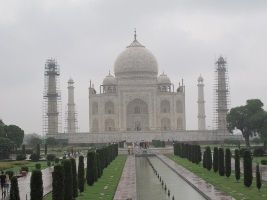 After a week in India, I would very much agree with Eugene. When you analyze the condition of most Indians, it is easy to see a stark difference between their lives and the lives of those who are considered the wealthy. As I am writing this report, there is a scandal brewing in Delhi over garbage in the streets. The report claims that the garbage has reached 40 meters in height with no relief in sight. Every city we visited in the past few days shows signs of the same problem. The monsoon season has begun here in India and many cities are experiencing some level of street flooding. That means the flood waters include raw sewage because of open sewer lines already stopped up with garbage. In city after city that we drove through while it was raining, we saw children playing in the streets with debris and raw sewage floating by.
After a week in India, I would very much agree with Eugene. When you analyze the condition of most Indians, it is easy to see a stark difference between their lives and the lives of those who are considered the wealthy. As I am writing this report, there is a scandal brewing in Delhi over garbage in the streets. The report claims that the garbage has reached 40 meters in height with no relief in sight. Every city we visited in the past few days shows signs of the same problem. The monsoon season has begun here in India and many cities are experiencing some level of street flooding. That means the flood waters include raw sewage because of open sewer lines already stopped up with garbage. In city after city that we drove through while it was raining, we saw children playing in the streets with debris and raw sewage floating by.
Most Indians have been living in the same poor conditions for centuries. Yes, there are cell phones, electricity (when it works), indoor plumbing (in some cases and when it works) and motorized vehicles. But there has been little change in the living conditions for the average person. Officially the caste system in India disappeared with independence in 1947, but that is simply not the case. Even our tour guide at the Taj Mahal stated that his caste is involved primarily in gardening. Jobs are gained and jobs are lost based on the caste one belongs to. Then there is the religious tension that exists throughout India.
Most of India is Hindu, but there is a sizable group of Muslims who simply don’t get along with the Hindus, especially since the partition in 1947 that created three countries—India, East Pakistan (Bangladesh today) and West Pakistan (Pakistan today). The Muslims were to move to one of the two Pakistans, and the Hindus were to live in India. This created massive bloodshed in the days leading up to independence in August of 1947. Thousands of Hindus were slaughtered by Muslims, and thousands of Muslims were slaughtered by Hindus. Mahatma Gandhi, one of the fathers of Indian independence, referred to those days as the time everyone “went mad.”
Today the Muslim population of India is growing throughout the country. The Muslims cannot be contained in the countries of Pakistan and Bangladesh. Of India’s 1.2 billion people, 84 percent are Hindu, and 10 percent are Muslim. The remaining 6 percent are Christians, Buddhists, and other eastern religions. Tension between the Muslims and the Hindus has led to violence from time to time. This is a problem that appears to have no solution.
In the midst of all this chaos, we have a small group of members scattered around the country. On our current trip to Asia, we have visited each one. In order to accomplish this task, after our arrival in Calcutta on June 15, we flew to Hyderabad via Mumbai; from there we flew to Delhi; and from there we drove to the cities of Moradabad, Agra and Jaipur. In addition to the various flights, we drove almost 700 kilometers, or 400 miles, which gave us a firsthand look at the countryside, but more than countryside, we saw people—people everywhere, by the thousands walking the streets of every city. It is hard to imagine living in this crush of humanity every day of your life. But this is what our members experience as part of their daily routine. Let me introduce you to the members in India and tell you their story.
Calcutta (Kolkata)
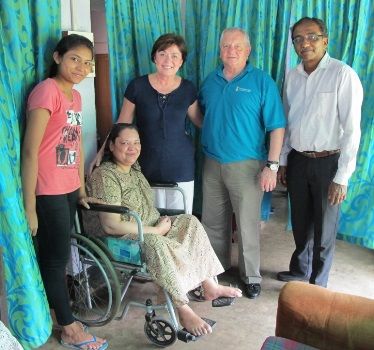 The name of the city was officially changed to Kolkata a few years back, but many, if not most, still use the name Calcutta except on official government documents. We have one member family in Calcutta, the Ghosh family—Tarun, Seema and Priscilla.
The name of the city was officially changed to Kolkata a few years back, but many, if not most, still use the name Calcutta except on official government documents. We have one member family in Calcutta, the Ghosh family—Tarun, Seema and Priscilla.
Tarun had no Church of God background when he found the Church on the Internet a few years back. He was confused about religion and simply did an Internet search on “Where are you God?” From that search, he came to the United Church of God website and then in 2010 became part of the Church of God, a Worldwide Association. He was baptized by David Baker.
His wife Seema requested baptism at the same time but experienced a massive stroke in 2011. She lost most of her mobility on her right side along with her speech. But Seema was not to be deterred, and an amazing thing happened last year at the Feast—Seema was baptized! David Jackson, an elder from Maryland who was attending the Feast in Calcutta, along with a couple of men put Seema into the swimming pool, chair and all, and baptized her! She was so happy. This was the first time I had seen Seema since her baptism, and she couldn’t help but tear up when we spoke about it.
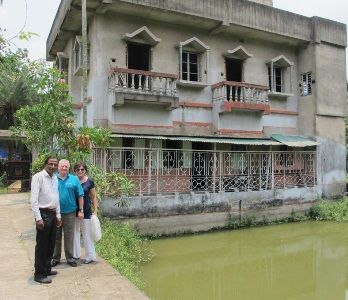 Seema continues to improve slowly, but still requires round-the-clock care. The Church has been able to help financially to make sure she gets the appropriate care. Priscilla helps while her father is at work, and he helps while she is at school. Then they both get relief through a paid helper who comes each day for about six hours. So, in spite of the difficulty, they are managing.
Seema continues to improve slowly, but still requires round-the-clock care. The Church has been able to help financially to make sure she gets the appropriate care. Priscilla helps while her father is at work, and he helps while she is at school. Then they both get relief through a paid helper who comes each day for about six hours. So, in spite of the difficulty, they are managing.
I really want to tell you about Priscilla. She is now 20 years of age, but was only 15 when her mother experienced her stroke. Her life changed dramatically, and she has been actively involved in taking care of her mother since that day in 2011. Currently Priscilla is within one year of graduating from college with an undergraduate degree. After that she wants to pursue her master’s in social entrepreneurship. This is a new degree that is being offered by some colleges in India. Priscilla sees the problems in her nation and wants to be part of the solution. Without a viable middle class, India will continue to be hopelessly divided between the very rich and the very poor. Priscilla desires to make things better for the people in her country.
Hyderabad
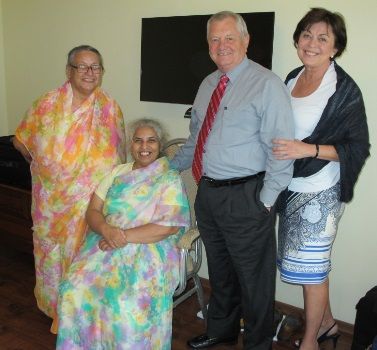 From Calcutta, we flew to Hyderabad on Friday, June 17, via Mumbai. In Hyderabad we scheduled a Bible study with the Ali sisters, Arjumand and Nargis. These two ladies have a long history with the Church of God in India. Their mother, Dr. Ali, was the original member of the Radio Church of God in the country of India. She was baptized by Raymond McNair in Bricket Wood, England, in 1960 where she was getting her doctorate. She returned to India shortly thereafter as a doctor. It was from that small beginning that several congregations of the Church of God arose in India. Eventually attendance at the Feast of Tabernacles exceeded 300. The Ali sisters were part of that history and they have remained faithful over the many years. In 1995 the Worldwide Church of God changed its major doctrines. As a result of these changes, Dr. Ali and her daughters eventually departed from the Worldwide Church of God.
From Calcutta, we flew to Hyderabad on Friday, June 17, via Mumbai. In Hyderabad we scheduled a Bible study with the Ali sisters, Arjumand and Nargis. These two ladies have a long history with the Church of God in India. Their mother, Dr. Ali, was the original member of the Radio Church of God in the country of India. She was baptized by Raymond McNair in Bricket Wood, England, in 1960 where she was getting her doctorate. She returned to India shortly thereafter as a doctor. It was from that small beginning that several congregations of the Church of God arose in India. Eventually attendance at the Feast of Tabernacles exceeded 300. The Ali sisters were part of that history and they have remained faithful over the many years. In 1995 the Worldwide Church of God changed its major doctrines. As a result of these changes, Dr. Ali and her daughters eventually departed from the Worldwide Church of God.
It was a real joy to see Arjumand and Nargis. They have a zest for life and an enthusiasm for the truth. It was an inspiration to once again spend a Sabbath with members whose association with the Church began more than 50 years ago.
Moradabad
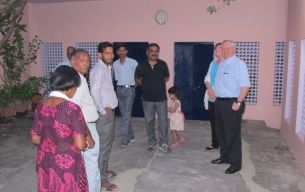 From Hyderabad we flew back to Delhi on Sunday, June 19, and from there we rented a car and driver to take us to Moradabad. Moradabad is a Muslim city about 200 kilometers northeast of Delhi. Moradabad is actually close to Nepal, and many of the people in this region look more Asian than Indian. Our largest group in India is located here in Moradabad. This group is made up entirely of the family and friends of Eugene Vimal Kumar, who grew up in the Church of God during the 1970s. What a treat it was to visit with Eugene and his beautiful family. There were 15 of us together for a Bible study on Sunday evening. This number included Eugene, his wife, their two children, his parents, his sister, and a longtime friend and his family. I first met this group back in 2014, and it was good to see them again.
From Hyderabad we flew back to Delhi on Sunday, June 19, and from there we rented a car and driver to take us to Moradabad. Moradabad is a Muslim city about 200 kilometers northeast of Delhi. Moradabad is actually close to Nepal, and many of the people in this region look more Asian than Indian. Our largest group in India is located here in Moradabad. This group is made up entirely of the family and friends of Eugene Vimal Kumar, who grew up in the Church of God during the 1970s. What a treat it was to visit with Eugene and his beautiful family. There were 15 of us together for a Bible study on Sunday evening. This number included Eugene, his wife, their two children, his parents, his sister, and a longtime friend and his family. I first met this group back in 2014, and it was good to see them again.
Eugene’s family runs a school in Moradabad. They have 300 students—all of whom are Muslim except for Eugene’s son Rex—in grades 1 through 8. Eugene shared with us some of the challenges of being Christian in a Muslim community. While there is rarely violence, there is always tension between their family and the Muslim majority. Our visit coincided with Ramadan, which is an official school vacation in this community. Classes will resume in mid-July after the month of fasting has concluded.
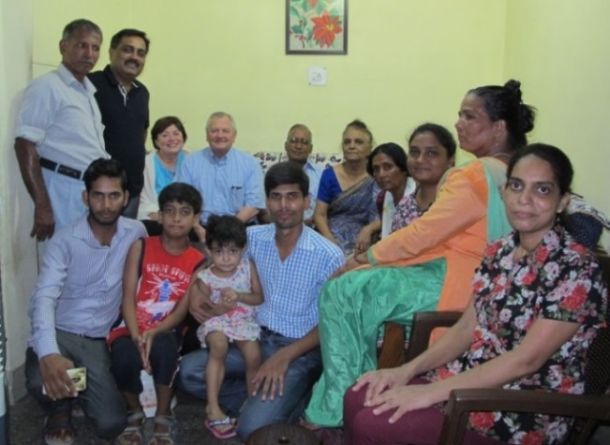 Here are the members who were present for our Bible study. Standing on the left are Anil Dalchand and Eugene. Seated on the couch are Sharron and Jim Franks, Robinson Yusuf, Dayamani Yusuf (Eugene’s parents), Heramani (Eugene’s aunt), Rachel (Eugene’s sister), Mrs. Dalchand (wife of Anil), and Deepti (wife of Eugene). Down in front are Mark Dalchand, Rex Kumar, Jennifer Kumar, and Sam Dalchand. With the exception of Anil and his family, all are related. It was a joy to spend an evening with them. After our Bible study, we had a wonderful meal together.
Here are the members who were present for our Bible study. Standing on the left are Anil Dalchand and Eugene. Seated on the couch are Sharron and Jim Franks, Robinson Yusuf, Dayamani Yusuf (Eugene’s parents), Heramani (Eugene’s aunt), Rachel (Eugene’s sister), Mrs. Dalchand (wife of Anil), and Deepti (wife of Eugene). Down in front are Mark Dalchand, Rex Kumar, Jennifer Kumar, and Sam Dalchand. With the exception of Anil and his family, all are related. It was a joy to spend an evening with them. After our Bible study, we had a wonderful meal together.
Seeing the sights
After visiting all the members, we took two days to see the sights. We traveled by car to Agra where we visited the Taj Mahal and the Red Fort. From there we drove to Jaipur, where we visited the home of the Maharaja of Rajasthan. We took in three palaces in one day. The temperature was very warm, around 100 degrees Fahrenheit, so we were definitely worn out by the end of that day.
I am writing this report from Delhi, as we spend our final night in India. Our trip has been a great success. We visited all the members and caught a few of the sights that make India a favorite destination for foreigners. We spent more than a week in this amazing and diverse country. We traveled from east to west and north to south in our journey. The physical wealth in the country was staggering, but so was the poverty. You can’t help but feel sorry for the average Indian and the struggles they must face each and every day just to survive. With 1.2 billion people, the vast majority of whom live in abject poverty, India provides a clear picture of a world that desperately needs the return of Jesus Christ.
Tomorrow we fly out to Sri Lanka, where we will enjoy the Sabbath with the members in the city of Colombo. We look forward to seeing the brethren, but we are now anxious to get home. Next stop, Sri Lanka!








